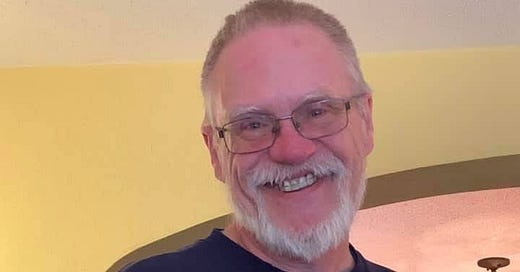This was a fun idea I had one year. I interviewed my friends and acquaintances and old teachers and mentors. I sent them questions about their Bibliophilic habits and the books haunting their nightstands.
I am reviving the interviews this summer and posting one each week. This was my very first interview with my husband, Tony. He was easy as he is tremendously well and widely read.
You may get a message in your substack asking you to come and play. So, keep an eye out. The only criterion is that your bookshelves are two deep with books and sagging a bit, not to mention the ones pooled on the floor. 😂
INTERVIEW WITH A BIBLIOPHILE
This is Episode 1 of our newest installment of interviews with some notorious bibliophiles...specifically known as "two stackers". We ask questions about tastes, reading habits, and preferences. This is to pique some interest among friends and family about new book finds, to perhaps stir up some thought provoking ideas, and to simply share our mutual love of books. I will interview Students, recent college graduates, Dads both young and old, an amatuer archivist, a poet, a young mom with a penchant for literature, and others. If you love books, I hope you will join us and take a look.
Tonight we caught up with Tony Trull: father of seven, likes building campfires, perusing the library, and has recently embarked on a classical music appreciation course of his own making. Always ready to sit down and talk politics and history and to learn something new. Welcome back to the show!
ME:
Why does a busy person such as yourself – husband, father, homeowner, bread winner – prioritize reading when there are so many other demands on your time? What are you seeking?
TONY:
I'll stand with Kipling in this respect and in times like these when he says, “If you can keep your head while all about you are losing theirs…” I guess I’ve been trying to understand the American experiment in theory and lived experience along with its world context and technological optimism – that can-do ingenuity that got us here. For the purpose of seeing our times in perspective
The early 19th century United States has been one of my areas of intense interest. I think that’s because so much was happening good and bad: working out how the constitutional ideas shape and are shaped by events; the restless energy in the new country so that settlers couldn’t be kept within boundaries; the greed and brutality that characterized so many dealings with Indians, with slaves, with the Spanish and with the Mexicans; the attempt by a minority to retain power – and somehow positive things
survived.
Books I’ve read this year on this subject include ALAN TAYLOR'S “AMERICAN REPUBLICS”, RICHARD HENRY DANA'S “TWO YEARS BEFORE THE MAST” and I’m currently reading, slowly, the DIARIES OF JOHN QUINCY ADAMS. “HOW INNOVATION WORKS” by MATT RIDLEY which takes up the technological optimism thread along with books about Unix and the programming language Python.
And we can’t forget China! I read a biography of SIMON LEYS who was a Belgian Sinologist in the latter half of the 20th century. He helped rip the veil of respect from Mao Tse Tung that had been draped over him by French intellectuals. I’m also reading a Nobel winning dissident, LIU XIAOBO, and his “NO ENEMIES, NO HATRED".
ME:
What is a favorite book you’ve read this year?
TONY:
“UNDAUNTED" by John Brennan. Longtime in the CIA, director of the agency. I tend to forget recent decades and it was good to retrace them from Brennan’s perspective.
ME:
Have you perhaps tried a new genre of book that you wouldn't have picked up in the past?
TONY:
I don’t know if it’s a new genre, but I’m currently reading MONTAIGNE'S "ESSAYS" It is different than much of what I’ve read before.
ME:
What is on your future list?
TONY:
It’s a long list and includes some novels, some interesting works by CARL JUNG, a book on SEMIOTICS that my son Ben loaned me, and, of course, some more of ROBERT ALTER'S translation of the HEBREW TESTAMENT.
ME:
Ah, yes, Alter. It is no secret he is a favorite of yours? What attracts you to him?
TONY:
I find that from reading and rereading Bible stories I can become dulled to the actual words. Alter’s translation differs from the Revised Standard enough to help me see the verses anew. Alter’s purpose is to recapture the concreteness and pungency of the Hebrew in a literary, poetic English. His commentary on specific verses helpfully explains some of the idioms and historical context. On the other hand, his comments on particular Hebrew words or phrases are lost on me. He published a “Story of David” that combined narrative threads from several books of the Bible into
one story arc. That really helped me see David’s story much more clearly. One needs to be aware that Alter seems to deliberately avoid theological word choices. For example, where the missal will provide a psalm that speaks of “salvation” and a “redeemer”, Alter will favor something like “rescue” or “rescuer.” From a believer’s standpoint, reading Alter provides a bas-relief to standard translations.
ME
Well thanks for sitting down with me tonight. Good luck with your list!





Though my shelves are crammed and piles of books lurk on every flat surface in my home, I’m always curious about what others are reading. Can’t wait for the next episode!
Great series and I love the criteria for the bibliophiles!